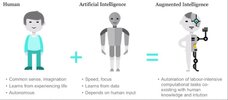Augmented AI aka Augmented intelligence refers to the integration of artificial intelligence (AI) systems to enhance and complement human capabilities rather than replace them. In this approach, AI technology is designed to collaborate with humans, providing valuable assistance, insights, and support in various tasks and domains.

Here's an explanation of Augmented AI:
1. Enhancing Human Decision-Making: Augmented AI systems are developed to assist individuals in making better decisions. These AI tools can process vast amounts of data quickly, identify patterns, and provide data-driven recommendations to aid human decision-makers.
2. Efficiency and Productivity: Augmented AI can automate repetitive and time-consuming tasks, allowing humans to focus on more creative, strategic, or complex aspects of their work. This boosts efficiency and productivity across various industries.
3. Personalized Experiences: In sectors like healthcare and e-commerce, augmented AI can analyze user data to offer personalized recommendations, services, or treatments, improving the overall user experience.
4. Safety and Reliability: In safety-critical industries like aviation and healthcare, AI can act as a second set of eyes, monitoring and alerting humans to potential issues or errors, thus enhancing safety and reliability.
5. Continuous Learning: Augmented AI systems can continuously learn and adapt from new data, making them valuable in dynamic environments where information changes rapidly.
6. Collaboration: The emphasis in augmented AI is on collaboration between humans and machines. This approach acknowledges that AI can provide valuable insights and support, but human judgment and expertise remain essential.

In summary, Augmented AI is a concept that envisions AI systems working alongside humans, complementing their abilities, and improving various aspects of decision-making, productivity, and user experiences across different domains and industries.

Here's an explanation of Augmented AI:
1. Enhancing Human Decision-Making: Augmented AI systems are developed to assist individuals in making better decisions. These AI tools can process vast amounts of data quickly, identify patterns, and provide data-driven recommendations to aid human decision-makers.
2. Efficiency and Productivity: Augmented AI can automate repetitive and time-consuming tasks, allowing humans to focus on more creative, strategic, or complex aspects of their work. This boosts efficiency and productivity across various industries.
3. Personalized Experiences: In sectors like healthcare and e-commerce, augmented AI can analyze user data to offer personalized recommendations, services, or treatments, improving the overall user experience.
4. Safety and Reliability: In safety-critical industries like aviation and healthcare, AI can act as a second set of eyes, monitoring and alerting humans to potential issues or errors, thus enhancing safety and reliability.
5. Continuous Learning: Augmented AI systems can continuously learn and adapt from new data, making them valuable in dynamic environments where information changes rapidly.
6. Collaboration: The emphasis in augmented AI is on collaboration between humans and machines. This approach acknowledges that AI can provide valuable insights and support, but human judgment and expertise remain essential.

In summary, Augmented AI is a concept that envisions AI systems working alongside humans, complementing their abilities, and improving various aspects of decision-making, productivity, and user experiences across different domains and industries.

